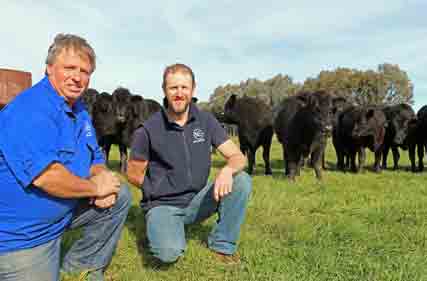
Jon Thomas and Brett Wright, North East Genetics, can advise on artificial breeding programs for beef and dairy cattle herds.
Dairy and beef producers with questions on artificial breeding, corrective mating and bull selection will be answered by the team from North East Genetics at Henty Machinery Field Days this year.
North East Genetics draws on a comprehensive team of beef bulls from local and international sources, and aims to increase market share among stud and commercial beef herds.
Breeds available include Angus, Red Angus, Shorthorn, Charolais, Simmental, Limousin and Speckle Park.
On the dairy side, semen from all major breeds is available including locally bred Holstein, Jersey and Aussie Red.
North East Genetics is owned and operated by Jon Thomas and Brett Wright.
Originally from Tallangatta, Mr Thomas began his career at Riverina Artificial Breeders followed by Consolidated Herd Improvement Services where he oversaw the establishment of a Bega branch.
He then worked for Genetics Australia and Herd Improvers Australia, specialising in artificial insemination and marketing.
Jon established North East Genetics in 2009 with Brett Wright buying into the business shortly after.
Full-time staff include Ross Scammell, in the North East, and Scott Allcock, at Bega, NSW.
Originally from Albury, Brett worked as an AI technician through the Goulburn Valley before taking on a position as wholesale semen representative with ABS Australia.
“North East Genetics service from Dederang to Mitta, Corryong, up to Wagga, and across to Bega with some work in the north to Mudgee but are looking to expand,’’ Mr Wright said.
“We do freeze branding, ultrasound pregnancy testing, dehorning, corrective mating programs and source dairy and beef semen from all over the world.’’
“In the dairy industry, we have used a lot of fresh sexed semen for the past four years – we initially trialled it with local customers and the results were good.
“We are now one of the biggest users of fresh sexed semen in Australia.
“The most consistent results are achieved in dairy heifers with critical mating weights of 300-330kg and 250-280kg in beef heifers.’’
Mr Wright said the percentage of live semen increased in the fresh doses compared to frozen straws.
With the buoyant beef market over the past 18 months, the business partners thought the timing was right to increase their market share by exhibiting at the field days.
“AI is becoming more appealing for beef farmers as bull prices are so high – a round of AI in heifers can be a more viable option,’’ Mr Thomas said.
“Heifers must be on a rising plane of nutrition and handled quietly to reduce stress and optimise conception rates.
“There is so much data around on calving ease and gestation length, the risk of having bigger calves out of heifers is negligible.
“AI gives farmers the opportunity to tighten calving patterns with a big draft of calves all the same age make it more appealing to buyers.’’
Mr Thomas said the presence of North East Genetics at Henty this year was dipping “the toe in the water’’.
“It is a good place to start with the big crowds and dairy customers travelling over from the coast,’’ he said.
“We will have information on the synchronisation programs we use, pregnancy testing, freeze branding, genetics from a range of companies and countries and bull selection.
“We also specialise in tank refill and supply.’’
Mr Thomas said cow numbers in Victoria’s north-east had not been affected by the industry crisis.
“We are still seen as a safe climate area and it’s a curve ball we all have to adjust to,’’ he said.
Brett Wright and Ross Scammell attended a reproductive management course in the US this year.
Mr Wright said the intensive five-day course covered cow physiology, the heat cycle, reproductive management, and the affect of heat stress on conception rates in dry cows.
“The US research showed if the cow is exposed to variants in temperature during its dry period, she will have difficulty calving and problems with cycling,’’ he said.
“Nutrition also has a huge affect on conception rates in dry cow – cows on a poor diet during their dry period struggled to conceive and were more likely to suffer from mastitis.’’
Mr Wright was impressed by the level of cow comfort practiced in the US dairies visited.
“The cows were in sheds with air conditioning and fans, while some had heated bedding in the colder regions – they were happy, comfy, healthy and productive cows,’’ he said.
